中考中考英语专题之名词性从句(表从同位从)教师版 (6)
(完整版)中考英语名词性从句讲解+练习(教师版)
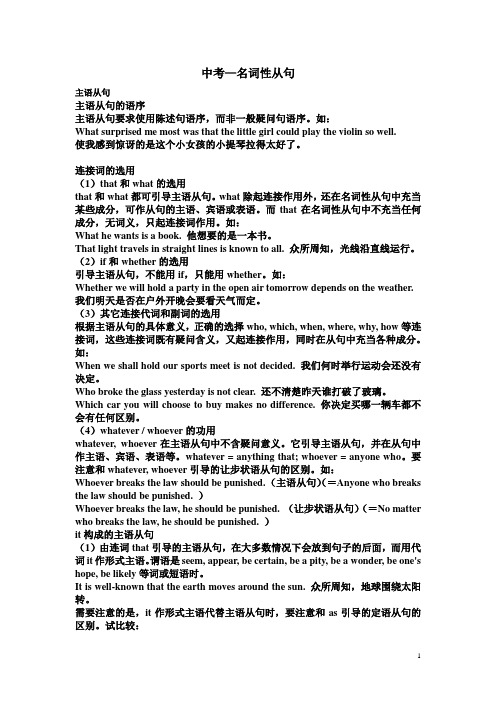
中考—名词性从句主语从句主语从句的语序主语从句要求使用陈述句语序,而非一般疑问句语序。
如:What surprised me most was that the little girl could play the violin so well.使我感到惊讶的是这个小女孩的小提琴拉得太好了。
连接词的选用(1)that和what的选用that和what都可引导主语从句。
what除起连接作用外,还在名词性从句中充当某些成分,可作从句的主语、宾语或表语。
而that在名词性从句中不充当任何成分,无词义,只起连接词作用。
如:What he wants is a book. 他想要的是一本书。
That light travels in straight lines is known to all. 众所周知,光线沿直线运行。
(2)if和whether的选用引导主语从句,不能用if,只能用whether。
如:Whether we will hold a party in the open air tomorrow depends on the weather. 我们明天是否在户外开晚会要看天气而定。
(3)其它连接代词和副词的选用根据主语从句的具体意义,正确的选择who, which, when, where, why, how等连接词,这些连接词既有疑问含义,又起连接作用,同时在从句中充当各种成分。
如:When we shall hold our sports meet is not decided. 我们何时举行运动会还没有决定。
Who broke the glass yesterday is not clear. 还不清楚昨天谁打破了玻璃。
Which car you will choose to buy makes no difference. 你决定买哪一辆车都不会有任何区别。
(4)whatever / whoever的功用whatever, whoever在主语从句中不含疑问意义。
英语英语:名词性从句考点
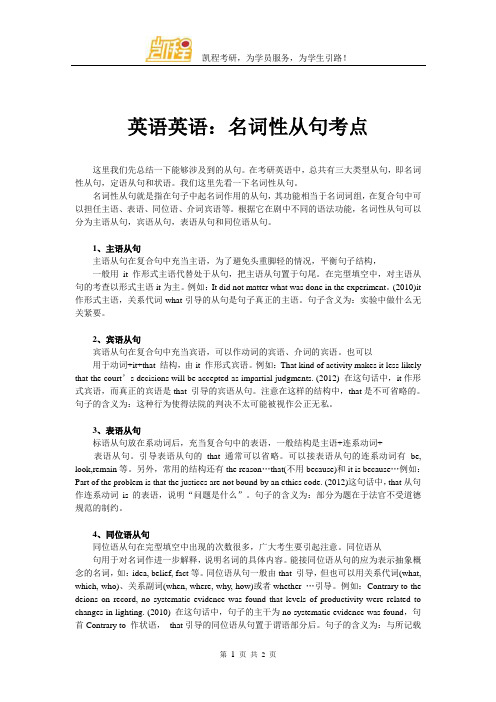
英语英语:名词性从句考点这里我们先总结一下能够涉及到的从句。
在考研英语中,总共有三大类型从句,即名词性从句,定语从句和状语。
我们这里先看一下名词性从句。
名词性从句就是指在句子中起名词作用的从句,其功能相当于名词词组,在复合句中可以担任主语、表语、同位语、介词宾语等。
根据它在剧中不同的语法功能,名词性从句可以分为主语从句,宾语从句,表语从句和同位语从句。
1、主语从句主语从句在复合句中充当主语,为了避免头重脚轻的情况,平衡句子结构,一般用it作形式主语代替处于从句,把主语从句置于句尾。
在完型填空中,对主语从句的考查以形式主语it为主。
例如:It did not matter what was done in the experiment。
(2010)it 作形式主语,关系代词what引导的从句是句子真正的主语。
句子含义为:实验中做什么无关紧要。
2、宾语从句宾语从句在复合句中充当宾语,可以作动词的宾语、介词的宾语。
也可以用于动词+it+that 结构,由it 作形式宾语。
例如:That kind of activity makes it less likely that the court’s decisions will be accepted as impartial judgments. (2012) 在这句话中,it作形式宾语,而真正的宾语是that 引导的宾语从句。
注意在这样的结构中,that是不可省略的。
句子的含义为:这种行为使得法院的判决不太可能被视作公正无私。
3、表语从句标语从句放在系动词后,充当复合句中的表语,一般结构是主语+连系动词+表语从句。
引导表语从句的that通常可以省略。
可以接表语从句的连系动词有be, look,remain等。
另外,常用的结构还有the reason…that(不用because)和it is because…例如:Part of the problem is that the justices are not bound by an ethics code. (2012)这句话中,that从句作连系动词is的表语,说明“问题是什么”。
(完整word版)初中英语中考语法名词性从句
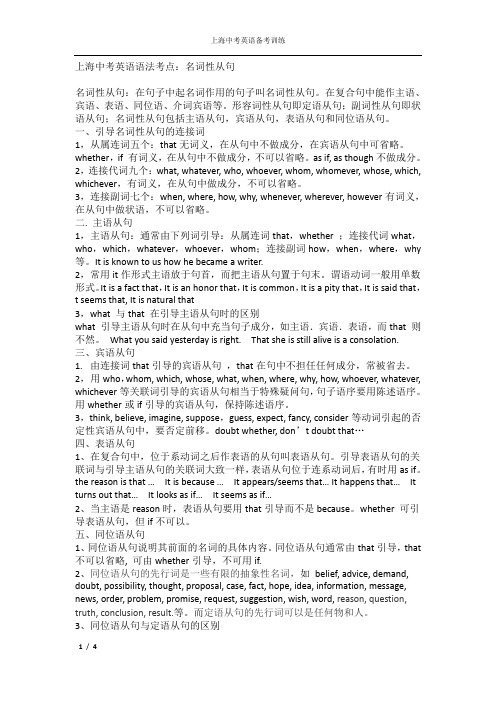
上海中考英语语法考点:名词性从句名词性从句:在句子中起名词作用的句子叫名词性从句。
在复合句中能作主语、宾语、表语、同位语、介词宾语等。
形容词性从句即定语从句;副词性从句即状语从句;名词性从句包括主语从句,宾语从句,表语从句和同位语从句。
一、引导名词性从句的连接词1,从属连词五个:that无词义,在从句中不做成分,在宾语从句中可省略。
whether,if 有词义,在从句中不做成分,不可以省略。
as if, as though不做成分。
2,连接代词九个:what, whatever, who, whoever, whom, whomever, whose, which, whichever,有词义,在从句中做成分,不可以省略。
3,连接副词七个:when, where, how, why, whenever, wherever, however有词义,在从句中做状语,不可以省略。
二. 主语从句1,主语从句:通常由下列词引导:从属连词that,whether ;连接代词what,who,which,whatever,whoever,whom;连接副词how,when,where,why 等。
It is known to us how he became a writer.2,常用it作形式主语放于句首,而把主语从句置于句末。
谓语动词一般用单数形式。
It is a fact that,It is an honor that,It is common,It is a pity that,It is said that,t seems that, It is natural that3,what 与that 在引导主语从句时的区别what 引导主语从句时在从句中充当句子成分,如主语.宾语.表语,而that 则不然。
What you said yesterday is right. That she is still alive is a consolation.三、宾语从句1.由连接词that引导的宾语从句,that在句中不担任任何成分,常被省去。
中考重点从句的引导词与从句类型
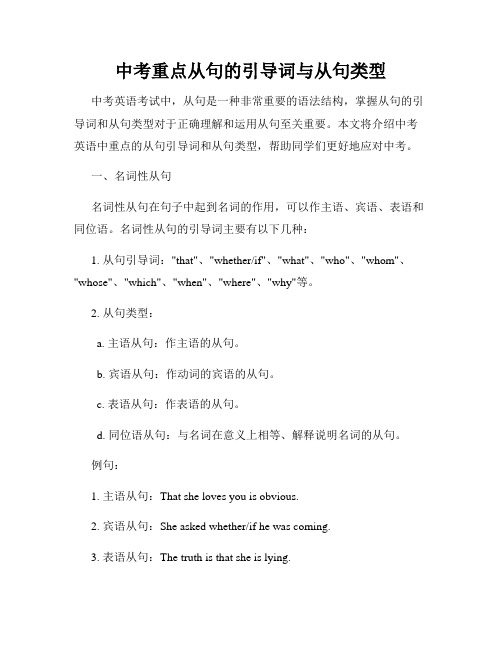
中考重点从句的引导词与从句类型中考英语考试中,从句是一种非常重要的语法结构,掌握从句的引导词和从句类型对于正确理解和运用从句至关重要。
本文将介绍中考英语中重点的从句引导词和从句类型,帮助同学们更好地应对中考。
一、名词性从句名词性从句在句子中起到名词的作用,可以作主语、宾语、表语和同位语。
名词性从句的引导词主要有以下几种:1. 从句引导词:"that"、"whether/if"、"what"、"who"、"whom"、"whose"、"which"、"when"、"where"、"why"等。
2. 从句类型:a. 主语从句:作主语的从句。
b. 宾语从句:作动词的宾语的从句。
c. 表语从句:作表语的从句。
d. 同位语从句:与名词在意义上相等、解释说明名词的从句。
例句:1. 主语从句:That she loves you is obvious.2. 宾语从句:She asked whether/if he was coming.3. 表语从句:The truth is that she is lying.4. 同位语从句:The fact that he failed surprised us all.二、定语从句定语从句用来修饰一个名词或代词,起到限定或修饰作用。
定语从句的引导词主要有以下几种:1. 从句引导词:"that"、"which"、"who"、"whom"、"whose"等。
2. 从句类型:a. 关系代词引导的定语从句:由关系代词引导的定语从句。
b. 关系副词引导的定语从句:由关系副词引导的定语从句。
中考英语--名词性从句精讲
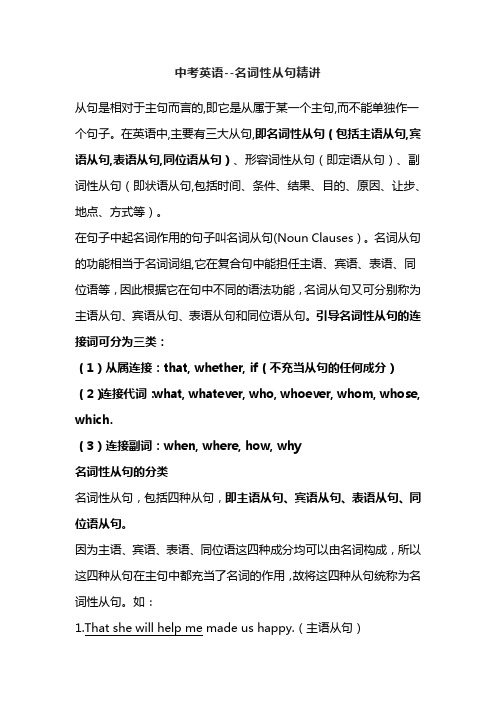
中考英语--名词性从句精讲从句是相对于主句而言的,即它是从属于某一个主句,而不能单独作一个句子。
在英语中,主要有三大从句,即名词性从句(包括主语从句,宾语从句,表语从句,同位语从句)、形容词性从句(即定语从句)、副词性从句(即状语从句,包括时间、条件、结果、目的、原因、让步、地点、方式等)。
在句子中起名词作用的句子叫名词从句(Noun Clauses)。
名词从句的功能相当于名词词组,它在复合句中能担任主语、宾语、表语、同位语等,因此根据它在句中不同的语法功能,名词从句又可分别称为主语从句、宾语从句、表语从句和同位语从句。
引导名词性从句的连接词可分为三类:(1)从属连接:that, whether, if(不充当从句的任何成分)(2)连接代词:what, whatever, who, whoever, whom, whose, which.(3)连接副词:when, where, how, why名词性从句的分类名词性从句,包括四种从句,即主语从句、宾语从句、表语从句、同位语从句。
因为主语、宾语、表语、同位语这四种成分均可以由名词构成,所以这四种从句在主句中都充当了名词的作用,故将这四种从句统称为名词性从句。
如:1.That she will help me made us happy.(主语从句)2.I can understand what he said.(宾语从句)3.This is where I was born.(表语从句)4.The fact that a heavy earthquake happened made me crazy.(同位语从句)名词性从句的连接词分类1.that(无含义,不充当成分)2.whether,if(有“是否”的含义,但不充当成分)3.连接代词:what, whatever, who, whoever, whom, whomever, whose, which, whichever.(在从句中做主语、宾语、表语和定语)连接副词:when, whenever, where, wherever, how, however, why (在从句中做状语)4. as if,as though,because(不充当成分,在名词性从句中只引导表语从句)连接词that 在名词性从句中可以省略的三种情况1.it 做形式主语,that引导主语从句时It is said (that) he has been studying abroad.据说他一直在国外学习。
中考英语语法之名词性从句
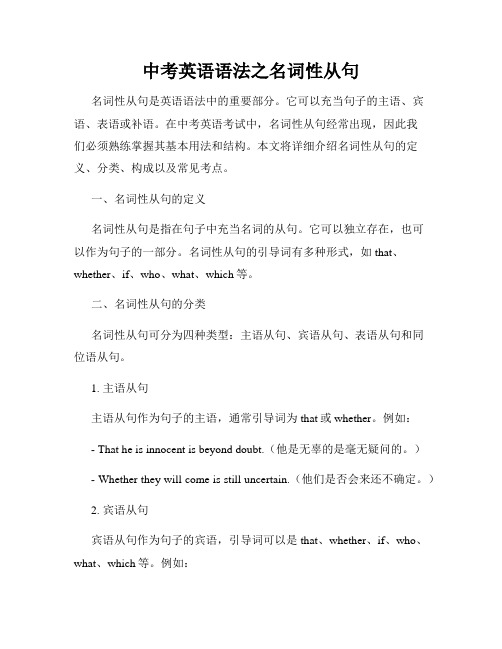
中考英语语法之名词性从句名词性从句是英语语法中的重要部分。
它可以充当句子的主语、宾语、表语或补语。
在中考英语考试中,名词性从句经常出现,因此我们必须熟练掌握其基本用法和结构。
本文将详细介绍名词性从句的定义、分类、构成以及常见考点。
一、名词性从句的定义名词性从句是指在句子中充当名词的从句。
它可以独立存在,也可以作为句子的一部分。
名词性从句的引导词有多种形式,如that、whether、if、who、what、which等。
二、名词性从句的分类名词性从句可分为四种类型:主语从句、宾语从句、表语从句和同位语从句。
1. 主语从句主语从句作为句子的主语,通常引导词为that或whether。
例如:- That he is innocent is beyond doubt.(他是无辜的是毫无疑问的。
)- Whether they will come is still uncertain.(他们是否会来还不确定。
)2. 宾语从句宾语从句作为句子的宾语,引导词可以是that、whether、if、who、what、which等。
例如:- I don't know if/whether he will come.(我不知道他是否会来。
)- She asked me what my favorite color was.(她问我最喜欢的颜色是什么。
)3. 表语从句表语从句用来说明主语的身份、性质等,引导词通常是that、whether或连接代词。
例如:- My hope is that they will succeed.(我的希望是他们会成功。
)- The question is whether we should agree or not.(问题是我们是否应该同意。
)4. 同位语从句同位语从句用来解释说明名词的含义或具体细节,通常引导词为that。
例如:- The fact that he passed the exam is not surprising.(他通过了考试这个事实并不令人惊讶。
《中考英语课件:名词性从句》

名词性从句练习题
1
练习一:
— Can you tell me when _______? — Tomorrow morning at 9:00.
2
练习二:
— I don't know if she _______ the party. — I believe she will.
3
练习三:
— What _______ at the meeting? — That we should work harder.
例句二:
Can you tell me if it is going to rain tomorrow?
例句三:
He doesn't believe what you said about him.
名词性从句的高频考点
中考英语中,名词性从句是一个常见的考点,需要多加练习和理解。掌握了 名词性从句的相关知识,可以提高解题的准确性和速度。
宾语从句
例句一:
I know that he is a good student.
例句二:
Can you tell me if the train has arrived?
例句三:
We are not sure whether it will rain tomorrow.
表语从句
1
例句一:
What surprises me is that he i例句一:
It is important that we stay calm in times of crisis.
例句二:
The teacher asked who had finished the homework.
英语名词性从句讲解【完整版】

2、I asked him if he could do me a favor .
If与whether的区别:
1、If不能引导放于句首的主语从句,而whether可以。 2、引导表语从句用whether,不用if。 3、引导同位语从句用whether,不用if。 4、whether可以引导从句作介词的宾语,不用if 。 5、whether or not 连在一起可以,但if不可以。而 “whether-----or not = if -----or not”
同位语从句:
定义:在复合句中充当同位语的句子。 同位语从句用来对其前面的抽象名词进行解释说明,被解释说明的词和 同位语在逻辑上是主表关系。 同位语常见名词:fact, suggestion, advice, idea, decision, news, thought, hope, belief, truth, doubt, promise, possibility, truth, warning, message, reason, report, question,explanation, wish, problem等。 常见的连接词:that, whether, what, who, how, when, where等。 用法: The thought that I want to buy my mother a birthday gift makes me excited.that 引导的同位语从句,解释说明 thought,从句不缺成 分 There is some doubt whether he will come. whether 引导同位语从句,if 不能引导同位语从句 we haven’t made the decision where we are going to spend our vacation. 有时同位语从句可以不紧跟解释说明的名词后面。 The news is surprising that he won the match.
- 1、下载文档前请自行甄别文档内容的完整性,平台不提供额外的编辑、内容补充、找答案等附加服务。
- 2、"仅部分预览"的文档,不可在线预览部分如存在完整性等问题,可反馈申请退款(可完整预览的文档不适用该条件!)。
- 3、如文档侵犯您的权益,请联系客服反馈,我们会尽快为您处理(人工客服工作时间:9:00-18:30)。
中考中考英语专题之名词性从句(表从同位从)教师版学科教师辅导讲义学员编号:年级:初三课时数: 3学员姓名:辅导科目:英语学科教师:授课类型C--词汇+翻译拓展训练C--名词性从句(表从+同位从)T--综合练习授课日期时段教学内容iii. 表语从句1. that表语从句1)常接表语从句的联系动词有be,look,remain,seem等。
2)引导表语从句的that不可省略。
2. wh-表语从句1)当表示“是否”之意时,引导表语从句的连词不能用if,只能用whether。
2)经常见到的句型有that is why,this/ it is because,this is where.等。
专项练习1.—Are you still thinking about yesterday's game?—Oh, that's ____________ .A. what makes me feel excitedB. whatever I feel excited aboutC. how I feel about itD. when I feel excited2. He never works hard. And that's he seldom passes the exams.A. whatB. thatC. whichD. why3. The reason ________ she gave for not being present was the heavy snow prevented her coming.A. /., becauseB. why, becauseC. /, thatD. why, whether4. Air to us is water is to fish.A. whatB. thatC. whichD. is that5. I don't know ________ i s _______ I was born.A. that, whenB. that, whatC. that, whereD. what, where Keys: 1-5 ADC ACiv. 同位语从句1. that同位语从句1.The difficulty lies we have no money.A. in whichB. in the fact thatC. in the factD. that2. She's a different girl from she was five years ago.A. whomB. thatC. whoD. what3. That is _________ h appened to the tribe of Indians that then lived in is now Plymouth.A. what... whichB. whatever... whicheverC. that.. .thatD. what.. .what4. They buried themselves in their studies in the belief they would serve their country with their knowledge.A. in whichB. thatC. whichD. where5. The reason why she burst into tears was she didn't want to part with her friends.A. becauseB. sinceC. forD. that6. The possibilities _________ many species of whales may become extinct soon don't stop some fishermen from continuing to kill them.A. /B. of whichC. thatD. why7. __________ I like best ________ bread and butter.A. That; isB. That; areC. What; areD. What; is8. Does it matter ________ will represent us to attend the meeting?A. you think whoeverB. who do you thinkC. you thinkD. who you think9. _________ is ________ me.A. It rains or not. . . no concern forB. Whether it rains or not... of no concern toC. If or not it rains. . . no concern aboutD. Whether or not it rains... of no concern with10. You can imagine _______ to skate or ski in Japan, Norway or Canada!A. how much loveB. what great loveC. how funny loveD. what a love11. Mike's uncle insists _______ in the hotel.A. staying notB. not to stayC. that we would not stayD. that he not stay12. We agreed to accept _______ they thought was the best tourist guide.A. whateverB. whomeverC. whicheverD. whoever13. Although many people view conflict as bad, conflict is sometimes useful it forces people to test the relative merits of their attitudes and behaviors.A. by whichB. to whichC. in thatD. so that14. It is essential that these application forms .A. must be sent as back as possibleB. will be sent back as possibleC. are sent as quick as it canD. be sent back as soon as possible15. Our teacher recommends that we as attentive as possible when we visit the museum.A. areB. shall beC. ought to beD. be16. I suppose that when I come back in ten years7 time, all these old houses down.A. will have been pulledB. will have pulledC. will be pullingD. will be pulled17. There is __________ the fact that failure is the mother of success.A. no denyingB. to not denyC. not to denyD. of denying18. She loves the newly born baby so much that her only happiness lies in she can take care of her child by herself.A. thatB. whatC. whenD. where19. What do you think ________ we should do with the polluted water?A. thatB. /C. howD. which20. What the doctors really doubt is _______ my mother will recover from the serious disease soon.A. whenB. howC. whetherD. why21. _________ is no possibility _________ B ob can win the first prize in the match.A. There. . . thatB. There. . . whetherC. It. . . whetherD. It. . . that22. He was asked of all the stories he had read was the most interesting.A. thatB. whatC. whichD. as23. The two areas are similar they both have a high rainfall during this season.A. except thatB. in thatC. in whichD. despite of24. It is recommended that the project until all the preparations have been made.A. is not startedB. was not startedC. will not be startedD. not be started25. We all agreed to the suggestion we have an outing, but we had a problem we could get there.A. that... howB. which... howC. which. . . whichD. that... thatKeys: 1-5 BDDBD 6-10 CDDBD 11-15 DDCDD 16-20 AAABC 21-25 ACBDA综合训练31. He was never satisfied with or proud of he had achieved.A. whatB. thatC. whichD. all which32. Can you tell me get to the railway station?A. how can IB. what I canC. how I canD. where I can33. We don't know ________ .A. this is whose dictionaryB. whose dictionary is thisC. whose dictionary this isD. whose is this dictionary34. The problem is _________ w e can finish the work within such a short time.A. thatB. whyC. howD. when35. ________the boy didn't take the medicine made his mother very angry.A. ThatB. WhatC. HowD. Which36. Each blind man believed he knew just the elephant looked like.A. that; whatB. what; thatC. that; thatD. what; what37. They have no idea at all .A. where he has goneB. where did he goC. which place had he goneD. where has he gone38. Do you know _________ y our parents are pleased you've done?A. why; for whatB. how; with whatC. that; with whichD. how; for what39. ________ is unfit for the office.A. It seems to me thatB. It seems to me that heC. That seems heD. That seems to him that40. That is ________ paper came into use in China.A. howB. thatC. whatD. which41. It looks _________ w e shall have to do the work ourselves.A. thatB. likeC. seemingD. as though42. _________ is not known yet.A. When she has goneB. Where she has goneC. How did she leaveD. Why did she go43. His suggestion _________ to see the exhibition interested every one of us.A. that we goB. which we should goC. that we would goD. when we should go44. I've got to make ________ he told a lie.A. that clearB. it clear thatC. quite clearD. this clear that45. Word came ________ his poem won the first prize.A. thatB. whetherC. asD. because46. Some people believe _________ easier for small countries to become strong and rich than for large .A. that; countryB. it; oneC. that; countriesD. it; ones47. _________ he said at the meeting astonished everybody present.A. WhatB. ThatC. The factD. The matter48. _________ he said is better than ________ he did.A. What, whatB. What, thatC. That, thatD. That, what49. It worried her a bit _________ her hair was turning gray.A. whileB. thatC. ifD. for50. —Do you remember ________ he came?—Yes, I do, he came by car.A. howB. whenC. thatD. if51. It is generally considered unwise to let a child freely do he or she wants.A. howeverB. whateverC. whicheverD. whenever52. Can you tell me _________ ?A. who is that womanB. who the woman isC. whom is the womanD. that woman is53. The fact _______ she works hard is well known to us all.A. thatB. whatC. whyD. which54. The mountain is no longer ________ it used to be.A. whichB. thatC. asD. what55. Jack said ________ to meet the American friends.A. which he pleasedB. he is pleasedC. that he was pleasedD. what he was pleased56. Lei Feng was always thinking of he could help others.A. thatB. howC. whomD. which57. Tom was disappointed that most of the guests when he at the party.A. left; had arrivedB. left; arrivedC. had left; had arrivedD. had left; arrived58. The question is you should do next.A. whatB. thatC. howD. why59. I know nothing about her but she is from Canada.A. howB. whenC. thatD. why60. It depends on we have enough time.A. ifB. if or notC. thatD. whetherKeys: 31-35 ACCCA 36-40 AABBA 41-45 D B A B A 46-50 DAABA 51-55 BBADC 56-60 BDACDADirections: Complete the following passage by using the words in the box. Each word can only be used once. Note that there is one word more than you need.A. concentratedB. possibleC. revisedD. applicationsE. figuresF. connectG. benefitsH. globalI. contributeJ. topsMore than two million people in Europe now have fiber broadband(光纤宽带)direct to their home, suggests a survey. The latest __29__ on super fast broadband delivered by fiber to the home (FTTH) show 18% growth over the last survey compiled in late 2008.The continued growth suggests that the __30__ economic decline has not hit plans to build fiber network s. Sweden __31__ the list of nations applying the technology, with 10.9% of its broadband customers using fiber. Karel Helsen, president of Europe’s Fiber-To-The-Home Council, said the growth matched predictions that were __32__ when the credit crisis started to make itself felt. “The numbers in 2009 are in line with the latest forecasts,” said Mr. Helsen.By 2012, the FTTH Council expects that 13 million people across 35 European nations will have their broadband delivered by fiber. Such services would start at a speed of 100 megabits per second (mbps), said Mr. Helsen. Around Europe more than 233 projects were underway to lay the fibers that would __33__ homes or buildings to the net, said Mr. Helsen. Many of those, he said, were being operated by local governments or smaller net firms. Local governments were interested in FTTH because of the economic and social __34__ it brought in its wake, said Mr. Helsen.The low delay in high-speed fiber networks made __35__ new uses of broadband, he said. “No delay is very important,” he said, “specifically if you talk about __36__ that are time-dependent such as personal communications, conference calls or video calls wh ere delays cause a lot of trouble.” While early FTTH services were __37__ in cities, said Mr. Helsen, many more were reaching out to rural areas for e-health and e-learning projects.Keys; EHJCF GBDABAncient Greek philosopher Aristotle viewed laughter as "a bodily exercise precious to health." Laughter does _37_____ short-term changes in cardiovascular(心血管的) function and respiration, boosting heart rate, respiratory rate and depth, as well as oxygen consumption. But because hard laughter is difficult to last, a good guffaw(loud laugh) is unlikely to have _38 ____cardiovascular benefits the way walking or jogging does._39_____, instead of building up muscles, as exercise does, laughter apparently accomplishes the _40______. Studies _41_____ back to the 1930s indicate that laughter relaxes muscles, decreasing muscle tone(肌肉紧张度) for up to 45 minutes after the guffaw subsides.Such physical relaxation might help _42_____ psychological stress. After all, the act of laughing probably does produce other types of physical feedback that _43_____ an individual's emotional state. In an experiment published in 1988, social psychologist Fritz Strack in Germany and his colleagues asked volunteers to hold a pen either with their teeth-thereby creating an artificial smile-or with their lips, which would produce a disappointed_____44_____. Those forced to exercise their smiling muscles _45_____ more energetically to funny cartoons than those whose mouths were contracted in a frown(皱眉)did, suggesting that expressions may influence _46_ rather than just the other way around.( )37. A. reflect ( )38. A. measurable ( )39. A. In turn ( )40. A. opposite ( )41. A. dating . ( )42. A. cause ( )43. A. improve ( )44. A. emotion ( )45. A. adapted ( )46. A. emotions B. demandB. manageableB. In factB. possibilityB. datedB. leadB. decreaseB. moodB. adjustB. motionsC. indicateC. affordableC. In additionC. averageC. to dateC. relieveC. relaxC. smileC. turnedC. movementD. produceD. sensibleD. In briefD. sameD. dateD. produceD. increaseD. expressionD. reactedD. motive37-46D A B A A C A D D ACIf English means endless new words, difficult grammar and sometimes strange pronunciation, you are wrong. Haven’t you noticed that you have become smarter since you started to learn a language?According to a new study by a British university, learning a second language can lead to an increase in your brain power. Researchers found that learning other languages changes grey matter. This is the area of the brain which processes information. It is similar to the way that exercise builds muscles.The study also found the effect is greater, the younger people learn a second language.A team led by Dr. Andrea Mechelli, from University College London, took a group of Britons who only spoke English. They were compared with a group of “early bilinguals” who had learnt a second language before the age of five, as well as a number of later learners.Scans showed that grey matter density(密度)in the brain was greater in bilinguals than in people without a second language. But the longer a person waited before mastering a new language, the smaller the difference.“Our findings suggest that the structure of the brain is changed by the experience of learning a second language,” said thescientists.It means that the change itself increases the ability to learn.Professor Dylan Vaughan Jones of the University of Wales, has researched the link between bilingualism and maths skills. “Having two languages gives you two wi ndows on the world and makes the brain more flexible(灵活的),”he said. “You are actually going beyond language and have a better understanding of different ideas.”The findings were matched in a study of native Italian speakers who had learned English as a second language between the ages of two and 34. Reading, writing, and comprehension were all tested. The results showed that the younger they started to learn, the better. “Studying a language means you get an entrance to another world,” explained the scient ists.41. The main subject talked about in this passage is_____________.A. science on learning a second languageB. man's ability of learning a second lang uageC. language can help brain powerD. language learning and maths study42. In the second paragraph, the writer mentions “exercise” in order to_____________.A. say language is also a kind of physical laborB. prove that one needs more practice when he (she) is learning a languageC. to show the importance of using the language when you learn the languageD. make people believe language learning helps grey matter work well43. The underlined word “bilingual” probably means_____________.A. a researcher on language learningB. a second language learnerC. a person who can speak two languagesD. an active language learner44. We may know from the scientific findings that_____________.A. the earlier you start to learn a second language the higher the grey matter density isB. there is no difference between a later second language learner and one who doesn't know a second languageC. the experience of learning a second language has bad effect on people's brainD. the ability of learning a second language is changing all the time45. In the last two paragraphs, the author wants to tell us that_____________.二、英语书面表达专项训练2.写作“百善孝为先”,孝敬父母是中华民族的传统美德。
